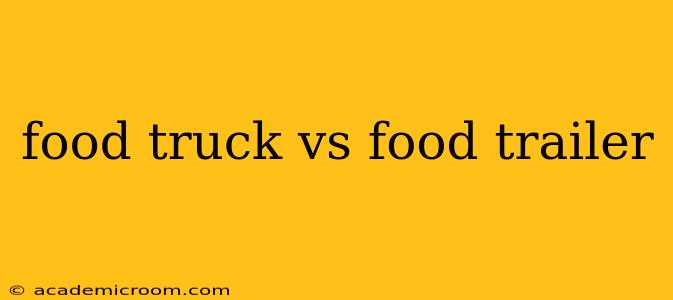The culinary world is buzzing with entrepreneurial energy, and food trucks and trailers are leading the charge. But which mobile foodservice option is best for your business? Choosing between a food truck and a food trailer involves careful consideration of several key factors. This comprehensive guide will help you navigate the decision-making process, weighing the pros and cons of each to find the perfect fit for your culinary dreams.
What's the Difference Between a Food Truck and a Food Trailer?
At first glance, food trucks and trailers might seem interchangeable, but key differences exist in size, maneuverability, and overall cost. A food truck is typically a converted vehicle, often a box truck or van, that's fully equipped for food preparation and service. A food trailer, on the other hand, is a separate unit towed behind a vehicle. This fundamental difference impacts several aspects of your business.
What are the Advantages of a Food Truck?
- Mobility and Flexibility: Food trucks are self-propelled, offering unparalleled flexibility to reach different locations and cater to various events. They can easily navigate streets and parking lots, giving you greater access to potential customers.
- Branding and Visibility: A well-designed food truck is a mobile billboard, instantly capturing attention and building brand awareness. Its unique appearance can make it a memorable landmark, attracting customers even from a distance.
- All-in-One Unit: Everything needed for operation, from cooking equipment to storage, is contained within the truck, eliminating the need for separate towing vehicles.
What are the Disadvantages of a Food Truck?
- Higher Initial Cost: Food trucks usually come with a significantly higher price tag compared to trailers, encompassing the cost of the vehicle itself, as well as renovations and equipment.
- Parking Restrictions: Depending on location and regulations, finding suitable parking spaces can be a challenge. Permitting and regulations vary greatly depending on your area.
- Maintenance and Repairs: Maintaining and repairing a large vehicle adds to the operational overhead.
What are the Advantages of a Food Trailer?
- Lower Initial Cost: Food trailers are generally cheaper to purchase and set up than food trucks. This can be a crucial advantage for entrepreneurs with limited startup capital.
- Easier to Tow: Trailers are easy to tow behind a variety of vehicles. This adds flexibility to transportation choices, particularly helpful for larger trailers.
- Customization Options: Food trailers offer broad customization options, allowing for specialized designs to accommodate specific needs.
What are the Disadvantages of a Food Trailer?
- Requires a Separate Towing Vehicle: This increases operational costs and reduces mobility compared to a self-propelled food truck.
- Limited Maneuverability: Trailers can be difficult to maneuver in tight spaces, limiting your potential locations.
- Less Visibility: Trailers often lack the inherent brand recognition of a customized food truck.
What is the average cost of a food truck vs. a food trailer?
The cost of both food trucks and trailers varies significantly based on several factors, such as size, features, and customization. A basic food trailer might start at around $10,000, while a fully equipped truck could range from $50,000 to well over $100,000. This considerable price difference is a major factor to consider.
Which is better for a small business?
For small businesses with limited capital, a food trailer offers a more affordable entry point. However, the reduced mobility and potential for lower visibility should be carefully weighed against the lower initial investment.
Which is better for events and festivals?
Both food trucks and trailers can participate in events and festivals, but the self-sufficiency of a food truck offers greater convenience in navigating event grounds and setting up in various locations. However, parking restrictions within the event space may need to be considered.
What are the legal requirements for each?
Legal requirements vary significantly by location. Before starting your business, research local regulations regarding permits, licenses, and inspections for both food trucks and trailers in your area. These regulations often cover food handling, safety, and parking.
Conclusion: Choosing the Right Mobile Foodservice Option
Ultimately, the best option – food truck or food trailer – depends on your specific business goals, budget, and operational needs. Carefully weigh the advantages and disadvantages outlined above, considering factors like initial investment, mobility, operating costs, and your target market. Thorough planning and research are key to making the right decision for your culinary venture. Consult with industry professionals and local authorities to get a clearer picture of what's best for your situation.
